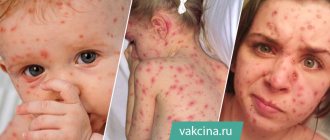March 05, 2021
Announcement : It is generally accepted that children suffer from chickenpox, but adults are also at risk of contracting this disease. In this case, the disease is severe and entails complications.
An acute infectious disease, commonly called chickenpox, is a consequence of airborne infection of the body with the herpes virus type III. The same pathogen causes herpes zoster. For others, an infected person becomes dangerous already a day before the first signs of the rash appear, as well as 3-5 days after it disappears.
If a person has already had chickenpox in childhood, then immunity to the disease remains with him for life. However, children do not always become infected with chickenpox, which already threatens them with serious consequences in adulthood if they come into contact with the virus.
Signs of chickenpox in adults
The list of symptoms almost completely repeats those in children, with the difference that each individual symptom manifests itself in its most severe form. A few days before the appearance of skin rashes, you most often notice:
- high temperature;
- weakness;
- indigestion;
- feeling of aching in the joints;
- headache;
- lymphadenopathy.
Subsequently, a red rash appears in the form of vesicles - blisters filled with liquid. Foci of rashes are noted on the hands, face, chest and more. As a person recovers, the vesicles crust over. From this point on, the patient is considered to be no longer infectious.
Incubation period and course of the disease
The incubation period is the time interval between the time a person becomes infected and the first symptoms of the disease appear. With chickenpox, it can range from 10 to 21 days.
Important! A person becomes infectious at the end of the incubation period. Most often this happens even before the first signs of the disease develop. The patient ceases to be contagious 4–5 days after the last rash appears.
After the incubation period there are 3 others:
- prodromal: no rash yet, general weakness, lasts 1–2 days;
- period of rash (with extensive clinical symptoms): characteristic rash, lasts 7–10 days;
- recovery (convalescence period): the rash disappears, the general condition returns to normal, takes 1–2 weeks.
During the prodromal period, body temperature may rise, and the person begins to feel sick. However, there are no specific symptoms of chickenpox.
The recovery period for people with weakened immune systems can be up to 4 weeks.
Complications of chickenpox
There are several groups of complications that occur in adults after the development of chickenpox. Infectious include various abscesses, as well as otitis media and conjunctivitis. Neurological complications manifest themselves in the form of encephalitis, meningitis, and nerve damage may even occur and pneumonia may develop.
In rare cases, cerebral edema is diagnosed against the background of an inflammatory process. With long-term treatment with large doses of aspirin, the occurrence of liver failure cannot be ruled out. In the absence of positive dynamics, toxic shock syndrome occurs due to poisoning of the body with decay products of dying tissues.
General information about the disease
Chickenpox or chickenpox is an acute infectious disease that primarily affects children.
Children aged 5–9 years are most often affected. Only 10% of the total are teenagers over 14 years of age and adults1. For them, children with chickenpox become the source of infection. The causative agent of the disease is human herpes virus type 3 - Varicella Zoster. It is transmitted by airborne droplets (along with droplets of saliva from sneezing, coughing, etc.) or by direct contact with the affected skin of a patient.
According to statistics, from 500 to 800 thousand new cases of chickenpox are recorded annually: this is 570 cases per 100 thousand people. Peak incidence is autumn and winter1.
Important! The chickenpox virus is unstable in the external environment and can remain active for no more than 15 minutes. Despite this, it is capable of spreading over long distances with air currents, including into adjacent rooms through the ventilation system.
Diagnosis of chickenpox
The basis for detecting herpes is a virological study - examination of media to detect the pathogen. In case of chickenpox, for diagnosis, liquid from vesicles is used, in which, when stained, accumulations of the pathogen, the Argan corpuscle, are isolated.
Chickenpox is usually distinguished from insect bites. The main difference is the lack of development of elements and bedding, as well as normal body temperature.
Also, the disease should be differentiated from:
- streptoderma - occurs without fever, the rash is different - cloudy, purulent contents, after involution leaving a yellow crust, in its place a red spot forms. The rash is located mainly behind the ears and on the extremities, never on the scalp (a hallmark of chickenpox).
- herpes zoster - the blisters are located strictly along the nerve trunk; they practically never occur on the legs and arms.
- vesicular rickettsiosis - a small scab forms at the site of the tick bite, followed by the formation of an ulcer (a scar forms in its place after healing). Enlargement of regional lymph nodes is typical.
Is it possible to wash yourself if you have chickenpox?
“Is it possible to swim if you have chickenpox?” is an age-old question parents ask their pediatrician. The answer depends on the patient’s well-being. In general, bathing with chickenpox is not only safe, but even beneficial - keeping the skin clean reduces the risk of secondary infection and promotes faster healing. However, at high body temperatures, it is better to refrain from water treatments and limit yourself to treating the rash elements with antiseptics.
If you have chickenpox, you can bathe in a weak solution of potassium permanganate or with herbal decoctions, but it is better to refrain from using cosmetics (shower gels and even soap). It is also undesirable to use washcloths and towels, as they can injure the skin.
Sources
- Chicken pox: adults at risk. Excerpts from the state report “On the state of sanitary and epidemiological well-being of the population of the Russian Federation.” Publishing house “Russian Doctor”, November, 2022.
- Chickenpox. Mayo Clinic.
- Chebalina, E. A., et al. “Chicken pox in pregnant women: risk, prevention, diagnosis, management tactics (clinical lecture).” Medical and social problems of the world 19, no. 4 (2014): 74-82.
- Yushchuk N.D. et al. “Chickenpox in adults” Attending physician #01/00 (2000).
- Scott Frothingham. Chickenpox in Adults. Healthline. 2018
- TASS News Agency, “Production of a domestic vaccine against herpes zoster will begin in 2027.”
- Rusakov, V. A., A. V. Chebykina, and V. A. Maidan. “Methods of medical control of chickenpox incidence.” Bulletin of the Russian Military Medical Academy S1 (2018): 170-172.
Rivanol
"Rivanol" is an antiseptic for external use in the form of a solution, effective in combating mainly coccal microorganisms (streptococci, staphylococci). It is these bacteria that usually cause complications with chickenpox (carbuncles, boils). "Rivanol" is used to spot treat ulcers 3-3 times a day. Contraindications: kidney problems and pregnancy.
Rivanol 0.1%
Dina+, UK
Rivanol is an antiseptic, has antimicrobial activity, fights coccal microorganisms, and is used in gynecology, urology, surgery, dermatology, and ophthalmology.
from 146
110
- Like
- Write a review
If a child or adult shows signs of chickenpox, it is recommended to contact the nearest branch of the Mama Papa Ya network of family clinics.
Unlike a regular local doctor, such a specialist will arrive to the patient faster.
- The doctor has much more time to examine the patient and prescribe treatment.
- Observation over time will help to detect early signs of complications in time and begin their treatment.
- The doctor will give recommendations to all family members on how to avoid infection, paying special attention to elderly and weakened patients.
The Mama Papa Ya clinic offers chickenpox vaccination services for children and adults. To do this, you need to make an appointment with a pediatrician or therapist, who, after an examination, will give a referral to a treatment room. An examination by a doctor and the vaccination itself take little time and are available in numerous branches of a network of clinics located in Moscow and other cities. Medical services are provided at affordable prices.
Reviews
Good clinic, good doctor!
Raisa Vasilievna can clearly and clearly explain what the problem is. If something is wrong, she speaks about everything directly, not in a veiled way, as other doctors sometimes do. I don’t regret that I ended up with her. Anna
I would like to express my gratitude to the staff of the clinic: Mom, Dad, and me. The clinic has a very friendly atmosphere, a very friendly and cheerful team and highly qualified specialists. Thank you very much! I wish your clinic prosperity.
Anonymous user
Today I had a mole removed on my face from dermatologist I.A. Kodareva. The doctor is very neat! Correct! Thanks a lot! Administrator Yulia Borshchevskaya is friendly and accurately fulfills her duties.
Belova E.M.
Today I was treated at the clinic, I was satisfied with the staff, as well as the gynecologist. Everyone treats patients with respect and attention. Many thanks to them and continued prosperity.
Anonymous user
The Mama Papa Ya clinic in Lyubertsy is very good. The team is friendly and responsive. I recommend this clinic to all my friends. Thanks to all doctors and administrators. I wish the clinic prosperity and many adequate clients.
Iratyev V.V.
We visited the “Mama Papa Ya” Clinic with our child. A consultation with a pediatric cardiologist was needed. I liked the clinic. Good service, doctors. There was no queue, everything was the same price.
Evgeniya
I liked the first visit. They examined me carefully, prescribed additional examinations, and gave me good recommendations. I will continue treatment further; I liked the conditions at the clinic.
Christina
The doctor carefully examined my husband, prescribed an ECG and made a preliminary diagnosis. She gave recommendations on our situation and ordered additional examination. No comments so far. Financial agreements have been met.
Marina Petrovna
I really liked the clinic. Helpful staff. I had an appointment with gynecologist E.A. Mikhailova. I was satisfied, there are more such doctors. Thank you!!!
Olga
Frequently asked questions
| Questions | Answers |
| Can an adult get chickenpox? | Yes, it is possible if the person did not suffer from this disease in childhood and was not vaccinated. |
| How long do adults get sick? | The duration of the disease depends on the individual characteristics of the body and the presence of concomitant pathologies and can vary from 1 to 5 weeks. On average, the acute phase takes 10–15 days. |
| What to do if your child gets sick and you have no immunity? | In such cases, it is necessary to limit contact with the child and undergo emergency prevention with a vaccine or immunoglobulins. At the same time, it is important to regularly ventilate the room in which the patient is located, carry out wet cleaning in it and use personal protective equipment (mask, gloves). |
| When does a sick person stop being contagious? | It is believed that a person with chickenpox ceases to be infectious to others 4–5 days after the last skin rash appears |
| How long is the incubation period for chickenpox? | The period from the moment of contact with a sick person to the appearance of the first symptoms of the disease can range from 10 to 21 days. |
| Is it possible to wash yourself if you have chickenpox? | If you have chickenpox, you must follow the rules of personal hygiene, including taking a shower. It is important to avoid rubbing the skin with a washcloth. After water procedures, you just need to blot your body with a towel without wiping yourself dry. |
| Is it possible to get infected a second time? | Re-infection with chickenpox, although extremely rare, does occur. This may be due to a sharp decrease in the body's defenses as a result of immunodeficiency states. Only 2% of people get chickenpox again.7 |
| How long does the chickenpox vaccine last? | When the immune system is functioning normally, the chickenpox vaccine is effective for life. |
| Is the chickenpox vaccine dangerous? | In the vast majority of cases, the chickenpox vaccine is well tolerated and does not cause serious complications. Possible adverse reactions include redness, soreness and mild swelling at the injection site, and rarely, minor rashes.5 |
Prevention
Preventive measures are divided into nonspecific and specific.
Nonspecific prevention includes general measures to prevent the spread of infectious diseases, including:
- avoid contact with a sick adult or child;
- Regularly carry out wet cleaning and ventilation of the room in which the sick person is staying.
Specific prevention is represented by a vaccine with a weakened live virus. Depending on the specific drug, the chickenpox vaccine is given to adults in one or two doses.
Should I get vaccinated against chickenpox?
The chickenpox vaccine is not included in the National Preventive Vaccination Calendar, but doctors recommend getting vaccinated.
Especially if there was contact with a sick person (within 72 hours) or there are concomitant pathologies or conditions that increase the risk of complications. These include immunodeficiency, cancer, diabetes mellitus, bronchial asthma and chronic renal failure. Absolute contraindications to chickenpox vaccination include:
- allergy to chicken eggs, since a similar protein is used in the preparation of the vaccine;
- individual intolerance to antibiotics from the aminoglycoside group;
- severe immunodeficiency, in which even a weakened virus can trigger the development of chickenpox;
- pregnancy.
As an emergency prophylaxis, immunoglobulin is administered to those who have contraindications to vaccination.
The chickenpox vaccine contains a weakened live virus. Photo: pixs4u / Depositphotos
For people who have already had chickenpox but have a weakened immune system, and people aged 50 years and older, vaccination against herpes zoster is recommended5.
The US Centers for Disease Control and Prevention recommends using the recombinant Shingrix vaccine produced by the British pharmaceutical company (GlaxoSmithKline). Russia does not yet have its own vaccine against herpes zoster. Its production, according to media reports, will begin in 20276.
Vaccination in preparation for pregnancy and after it
A woman who plans to become pregnant and has not previously had chickenpox can be vaccinated at least 3 months in advance of her intended conception. However, breastfeeding is not a contraindication to vaccination. If necessary, the vaccine can be administered in the first months after birth.
Treatment
Treatment of chickenpox in its standard course occurs at home after consulting a doctor. It is aimed at improving the general well-being of the patient: drugs whose active ingredient is paracetamol are used to reduce elevated body temperature.
In the vast majority of cases, patients suffer from unbearable itching of the skin. To alleviate the condition, special ointments and solutions are prescribed based on zinc and potassium permanganate, with the addition of tea tree oil. Antihistamines may be recommended. Often, a specialist will prescribe ointments whose action is aimed at destroying the viral pathogen.
In more serious cases (especially if there is concomitant shingles), the doctor will prescribe analgesics. In case of extremely reduced immunity, the patient is given immunoglobulins, and in case of intense intoxication of the body, detoxification solutions are administered.
Survey
To make a diagnosis, a clinical examination and indication of the fact of contact with a patient with chickenpox is sufficient. Specific laboratory examination is required if necessary to differentiate the disease from other conditions accompanied by a blistering rash.
Laboratory confirmation of chickenpox:
- detection of viral DNA in the blood using PCR - polymerase chain reaction;
- an increase in specific IgM and IgG antibodies in the blood by 4 times or more in 10 days.
- In a general blood test, a decrease in leukocytes and neutrophils and an increase in lymphocytes are observed. In some patients, the level of monocytes increases to 10%. A general blood test has no diagnostic value.
If complications are suspected, an X-ray of the lungs, an ultrasound of the heart, and an MRI of the brain are performed.
Features in pregnant women
Complications after chickenpox in adults frighten people who have not yet had time to recover from this disease. But pregnant women worry much more about this, fearing for the life of their unborn baby.
Unfortunately, the herpes virus ||| type has a strong damaging effect on the fetus. If a woman gets chickenpox in the first trimester, it most often leads to a miscarriage. In the second trimester, the fetus may develop malformations, defects of organs and systems, and after birth - developmental delays. If the expectant mother suffered the disease in the third trimester, this poses the least danger to the baby. But in rare cases, a newborn may develop congenital chickenpox, which can be fatal.
Therefore, it is important for pregnant women to undergo a blood test in a timely manner, which will show the presence of antibodies to particularly dangerous infections, and also to protect themselves and their unborn baby throughout the entire period of gestation.
Chickenpox and pregnancy
A special type of complications from chickenpox can occur in pregnant women. Chickenpox in early pregnancy can lead to a variety of problems in the newborn, including low birth weight and birth defects such as limb abnormalities. A particularly great threat to the child occurs when the mother gets chickenpox a week before giving birth. In this situation, there is a high risk of infection that is life-threatening to the newborn (congenital chickenpox syndrome).
If you are pregnant and have been in contact with someone who has chickenpox, be sure to talk to your doctor about the risks to you and your unborn baby.






